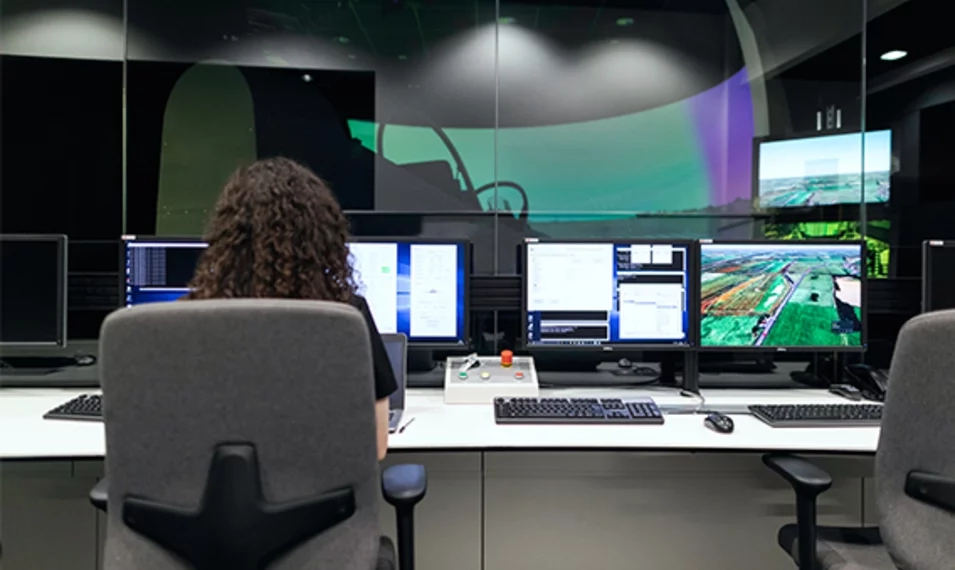, Apr 1, 2015
Organisation Overview
With around 23,500 students from 80 countries, Birmingham City University (BCU) is a large and diverse place to study. Its focus on practical skills and professional relevance is producing some of the country’s most employable graduates: the Sunday Times University Guide 2013 ranks BCU in the UK top 30 for the proportion of students entering graduate-level jobs. The University is currently investing £180 million in its estate to provide students with an enviable range of facilities.
The Challenge
Birmingham City University remains one of the most popular universities in the UK. In response to this student demand the University’s IT team, instigated a review of existing IT systems and processes in relation to the university’s IT strategy.
Shaun Buffery, Associate Director for Converged Infrastructure at the University and Dean England, Converged Infrastructure Architect Servers & Storage, led the assessment, combining both server/storage and networking backgrounds to address the needs of the University and converge the two key areas to provide an enhanced single solution.
Buffery commented, “Having students placed at the heart of university funding has dramatically changed their expectations of Higher Education. Today, we compete not just on the quality of education, but the quality of our facilities and services – providing the best service possible across the board is essential to the complete student experience.
“A subsequent review of existing IT infrastructure highlighted years of patchwork product upgrades, with little synchronisation across the network, not to mention issues with latency. Moreover, the data centre was desperately short of capacity, and the majority of our hardware was nearing end of life. In short, our IT infrastructure was not fit for purpose.”
Following the review, the university put out to tender the refresh of its core IT network infrastructure, data centre, and telephony. An ambitious project, Birmingham City University was keen to establish a level playing field and strong IT core.
“Rather than specify the technologies we needed, we placed our business objectives at the heart of the tender,” said Buffery. “We needed a partner that understood the pressures facing Higher Education establishments, that would design and implement a foundation that adapts to changes in the technologies and resources students expect to use and which enables staff to better collaborate with students.”
The Solution
Following a competitive tender, Logicalis UK was awarded the full contract. Inclusive of this is the design, installation and project management of four key areas:
- Design and fitting out of two on-site data centres
- Installation of a resilient, highly virtualised and consolidated architecture and VMware data solution
- Upgrade of the campus network, wired and wireless
- Roll-out of Cisco Unified Communications Manager to 4000 users
Early on in the tender process, the team recognised synergies between Logicalis and Birmingham City University, “A process of dialogue quickly established Logicalis as a leading contender.” Said Buffery. “ As well as solid practical experience, they not only understood the foibles and challenges Higher Education establishments face, but also able to point out pressures our network infrastructure will face several years down the line. We were singing from the same hymn sheet!”
Beginning phase one and two in early 2012, Logicalis has since completed the implementation of Birmingham City University’s core network refresh and the last of BCU’s twin data centres is going live in Autumn. Dean England, led the re-design and implementation of the two new data centres. He commented:
“The patchwork nature of our previous data centre meant a huge amount of time was wasted simply managing different management platforms. Now, with a reference data centre architecture, the IT team is not only able to work more efficiently day-to-day, but our data centre is too. We’ve reduced server sprawl, increased utilisation, and are already able to identify savings in energy expenditure.”
The revised data centres have also impacted Birmingham City University’s disaster recovery strategy; new back-up and de-dupe functionality, coupled with a refreshed campus network, is enabling a more effective and resilient storage and archive policy.
The network refresh saw the implementation of a 10GbE wired and wireless LAN for students and staff. The network now has the bandwidth to support growing demand from mobile devices, as well as the performance to enable real time applications such as voice, video and rich media applications.
The ability to adapt to changing technology use, particularly at student level, is especially important to England; “How students consume information is continually evolving and we have to keep pace. Today, this means providing fast and secure access to e-learning tools and resources, from anywhere and any device. Tomorrow, they’ll probably be writing their own applications to aid the education process. We’re confident our network can adapt.”
The final phase of the project, the rollout of Cisco’s Unified Communications Manager to 4000 users, is due for completion late 2013.
Key Benefits
The benefits to Birmingham City University from a converged, synchronised IT foundation will greatly impact the IT team and the organisation overall.
Alongside significant improvements in network speed, performance and capacity, the IT team is freed from excessive maintenance requirements; by implementing a reference data centre architecture and applying simple integration techniques, the resource burden and operational cost of maintenance has been dramatically reduced.
Birmingham City University also anticipates seeing RoI from the Cisco UC solution in just a few years time; “Providing staff with the tools to do their job enables them to deliver a better service to students.” Buffery continued. “A converged telephony solution will allow staff to become more independent, it gives them greater opportunity to engage with students via multiple, intuitive channels and manage admin tasks on the move. This means less time tied to their offices and more time face-to-face with our students.”
He concludes, “For BCU, ensuring students have the facilities to learn, and that staff are better equipped to teach is half the battle. The other half is having the ability to adapt to new practices and trends in Higher Education – working with young people, this means changing at a breakneck speed.
“Logicalis has provided us with a foundation that will mould with our needs and help the University achieve its mission to provide a business-class learning experience for its students, now and in the future. Logicalis has clearly established itself as our partner in this journey.”
Related Insights

Global , Aug 29, 2025
How Imperium have embraced a cloud-first strategy with Logicalis
Imperium partnered with Logicalis to navigate digital transformation, tackling compliance, security, and customer experience with strategic support and proactive IT services. Read the full solution to see how this partnership drives real impact.

Global , Jul 15, 2025
Cloud governance at scale: MAPFRE's journey towards digital efficiency
MAPFRE partnered with Logicalis Spain to simplify its complex multi-cloud environment by implementing a high-performance, secure Landing Zone in Azure. This enabled automated resource management, centralised governance, and agile scalability across over one million cloud assets.

Global , Jul 9, 2025
Revolutionising port operations: How Private 5G is powering automation at Peel Ports
Peel Ports is leading the way in port automation with a cutting-edge private 5G network at the Port of Liverpool. Discover how this ON-SIDE initiative is reshaping the future of logistics and infrastructure.

Global , Jul 3, 2025
How Sime centralised security with Logicalis and Microsoft Sentinel
Discover how Sime, a global investment holding company, transitioned from fragmented on-premise SIEM systems to a unified, scalable security framework—enhancing threat detection and reducing costs across regions.

Global , Nov 26, 2024
Case Studies, Videos
Logicalis DCC success story
Watch this video case study, which brings to life DCC’s transformative journey to standardise their approach to using Microsoft Azure across 50 businesses!

Global , Nov 20, 2024
One Planet, One Platform
How Logicalis connected their global carbon reporting dots with IBM Envizi.

Global , Nov 5, 2024
The Canadian International School of Hong Kong partners with Logicalis to fortify its security posture
Discover how Logicalis helped the Canadian International School of Hong Kong fortify its security posture.

Global , Oct 25, 2024
Case Studies, Videos
National Oceanography equip climate research vessels with Secure Connectivity
Read how the successful partnership between NOC and Logicalis delivered on the deployment of an advanced and all-encompassing wireless infrastructure solution that delivers improved levels of security to keep data safe.

Global , Oct 25, 2024
Case Studies, Videos
Logicalis partners with G.James to achieve sustainable business outcomes
G.James needed to modernise its ageing switching infrastructure whilst partnering with an organisation that aligns with their ESG goals and objectives.

Global , Oct 4, 2024
Noble Foods optimise operations and get closer to net zero with network transformation
Noble Foods sought to transform their network infrastructure to support critical business operations and meet sustainability goals.

Global , Sep 22, 2024
Driving innovation at Western Sydney University with an advanced Microsoft Azure approach
Logicalis Australia has assisted the University of Western Sydney (UWS) in enhancing their digital experience with an innovative migration to Microsoft Azure.

Global , Aug 16, 2024
Leading UK University partner with Logicalis to enhance campus experience with seamless and secure connectivity
Logicalis enabled the University to offer a modern, secure and user-friendly network that supports students and their devices around the clock.

Global , Jul 18, 2024
Case Studies, Videos
Digital Transformation of SMAS Torres Vedras
For SMAS Torres Vedras, the task at hand was not just about supplying water; it was about fostering public health, enhancing the quality of life, and promoting the benefits of consuming water from the public network.

The Rieck Group: Modernising IT infrastructure with Logicalis and FlashStack
Rieck Group partnered with Logicalis to completely modernise its IT infrastructure, replacing outdated systems with a high-performance, future-ready FlashStack solution. Read how this transformation enabled seamless operations, improved flexibility, and empowered Rieck to manage tasks in-house with greater efficiency.

Global , Apr 19, 2024
Enhancing security posture: A strategic partnership with a leading aerospace manufacturing corporation
Logicalis USA has partnered with a multinational corporation to execute a comprehensive Security Benchmark and Enablement Program. The initiative involves evaluating and enhancing the secure data management practices across 55 operating companies, aligning with government and Department of Defence security requirements.

Global , Apr 19, 2024
Enhancing security posture and operational efficiency for a leading health and toxicology company
An international health and toxicology company pursued a digital transformation to bolster security and operational efficiency. Facing challenges of security framework enhancement and staff turnover, the company sought a reliable IT security partner.

Global , Apr 19, 2024
UKI local authority strengthens cybersecurity and creates efficiencies with Logicalis and Microsoft Defender XDR
Large council recently worked with Logicalis to deploy the MXDR solution. This has drastically reduced the number of incidents and ensures complete resilience.

Global , Apr 19, 2024
Fortifying global gaming security: A Logicalis Intelligent Security success story.
Logicalis has successfully transformed the security infrastructure of a global lifestyle brand for gamers by deploying advanced MXDR capabilities. This initiative significantly enhanced security efficiency, reduced operational costs and improved the customer's security posture and resilience.

Global , Mar 7, 2024
Revolutionising mining operations with integrated communication solutions
A prominent Chilean mining company partnered with Logicalis to overcome operational challenges, including open-pit communications, new project execution, remote site connectivity, back-office automation, IT operations continuity, and network equipment renewal.

Global , Mar 7, 2024
Addressing Communication Challenges for an International Copper Producer
In the heart of Chile's mining landscape, a prominent international copper producer recently navigated complex communication and IT infrastructure challenges. Operating discreetly, this case study unveils the strategic objectives, implemented solutions, and resulting business benefits achieved by the client in overcoming these hurdles.

Global , Mar 7, 2024
Advancing Connectivity and Reliability with Private Wireless Networks
An international fertilizer company partnered with Logicalis to implement private 4G/5G networks, focusing on outdoor and indoor coverage. Logicalis deployed a phased methodology, ensuring redundancy with a decentralized model and achieving comprehensive coverage. The private 5G networks enhanced reliability, stability, and lower latency, supporting mission-critical applications in mining environments and setting the stage for future deployments across the client's operations in the US.

Global , Mar 7, 2024
Optimising Cloud Infrastructure Management for a Global Leader in Metals, Mining, and Logistics
A multinational metals, mining, and logistics corporation collaborated with Logicalis to optimize global operations and streamline its Azure-based digital transformation. The collaboration empowered the client to overcome infrastructure challenges, expedite cloud migration, and transition into a more agile, value-driven organisation

Global , Mar 7, 2024
Transforming Mining Operations Through Network Modernisation and Automation
Logicalis won the tender to modernize the plants of one of the world's largest iron ore producers, a global leader in the mining industry. The client faced challenges related to outdated network architecture, manual processes, and the need for centralizing operations to enhance management efficiency

Global , Mar 6, 2024
Enhancing Operational Efficiency and Security for a Global Leader in the Gold Mining Industry
Our client, a global leader in the gold mining industry, maintains a significant presence in South Africa, with operations extending to Papua New Guinea. The company operates nine underground mines, one open-pit mine, and various surface operations within South Africa.

Global , Nov 18, 2023
Auto & General SEA embarks on a cloud transformation journey with Logicalis
Auto & General SEA partnered with Logicalis to migrate from a private cloud to Microsoft Azure, resolving inefficiencies with their previous vendor by improving service responsiveness, scalability, and cost optimisation through the Digital Services Platform.
Global , Oct 11, 2023
Galp Energia modernises IT infrastructure with Logicalis and Cisco
Galp Energia, a multinational energy company, partnered with Logicalis, Cisco, and Vodafone to modernise its outdated network infrastructure to enable digital transformation, improve customer experience, and support future innovation.

Global , Sep 21, 2023
Logicalis enhances APDL's Network with Cisco ACI
Logicalis implemented the Cisco Application Centric Infrastructure (ACI) solution because, in addition to being the industry's leading SDN (Software Defined Networking), it automates the network and security in a web interface for workloads on physical servers, virtual machines, containers or the public cloud.

Global , Aug 14, 2023
Advancing Collaboration and Future-Ready Solutions for a Research Organisation
Over four years, Logicalis has played a pivotal role as a collaborative partner for a research organisation, facilitating the transformation of their collaboration ecosystem with cutting-edge solutions and services. This collaboration stands as the largest contract between the research organisation and an external partner. Going beyond this, Logicalis is poised not only to continue its collaboration efforts but also to establish the groundwork for network and security solutions.

Global , Aug 11, 2023
Revolutionizing Chemical Plant Monitoring with Private Wireless Solution
The alliance between Logicalis, Cisco, and AirSpan RAN enabled our client to leverage the capabilities of Private Wireless technology, revolutionising their chemical plant monitoring practices. Overcoming wireless disruptions and facilitating constant monitoring, the client's commitment to safety, efficiency, and data accuracy was significantly enhanced. This successful deployment exemplifies the transformative potential of technology-driven solutions within the manufacturing sector, contributing to the continued success of our client.

Global , Aug 9, 2023
Yamaha Motors migrates to Azure, achieving greater performance, reducing failures, and laying the foundations for Industry 4.0
Yamaha Motors started with an assessment of its IT environment and then chose to move most of their applications to the Azure cloud. They relied on the support of Logicalis to migrate and manage cloud environments.

Global , Aug 2, 2023
Empowering Operational Transformation A Case Study of a Progressive County in the USA
Facing challenges with an aging network infrastructure and a reduced network team (from 6 staff to 2), the county sought to modernize its operational service delivery model to ensure 24x7x365 network coverage and improved security.

Global , Aug 2, 2023
Advancing Sustainable Building Transformation A Case Study with a Leading Energy Company
This case study highlights the collaboration between Logicalis and a prominent energy company to modernize buildings, enhance operational efficiency, and promote sustainability.

Global , Aug 2, 2023
Logicalis Constructs and Oversees Network Infrastructure for a Premier Healthcare Ecosystem
Leading clinical diagnostics company in South America with multiple brands, was in the process of building its new administrative headquarters. With the consolidation of the group's companies and the change of building, the company needed to develop a new IT structure that could support its collaborative work format and leverage the latest technology.

Global , Aug 2, 2023
Modernizing Global IT Infrastructure A Case Study of a Large Food Producer
A large food producer known for its prominent role in the food industry faced the challenge of modernizing its IT infrastructure globally. The historically grown infrastructure lacked homogeneity and had become outdated due to multiple suppliers with varying pricing and project standards. The company sought a global managed network service focused on LAN, Wireless LAN, and Security to overcome these challenges and build a solid foundation for future digital service solutions. Logicalis, a global Cisco Gold Partner, provided the ideal solution, offering 24x7x365 full managed service, central helpdesk, monitoring, service & transition management, professional services & consulting, and ongoing support

Global , Aug 2, 2023
Empowering Growth A Successful Collaboration with a Global Energy Supplier
A global utility-backed seaborne energy trader aimed to expand its operations by 50% over the next three years. However, the lack of a predictable cost base and standardized processes posed challenges to achieving this goal. Logicalis offered a managed services contract to address these issues, enabling the client to achieve their objectives while creating new opportunities for Logicalis in the modern workplace and security sectors.

Global , Aug 2, 2023
Enhancing Network Efficiency for a Global Automotive Manufacturer
Working with a prominent multinational automotive manufacturer with a vast workforce spread across more than 25 countries, Logicalis was entrusted with the task of optimizing their connectivity, ensuring network resiliency, and enhancing application performance visibility.

Global , Jun 20, 2023
Auto & General SEA embarks on a cloud transformation journey with Logicalis
Insurance solutions firm Auto & General has embarked on a cloud transformation journey in Southeast Asia (SEA), tapping on IT services provider Logicalis.

Global , Apr 12, 2023
Logicalis helps BPAY find their dream tech solution
Logicalis use Azure DevOps to deploy Azure Virtual Desktop that saved money, increased productivity, while delivering built-in agility and scalability for the future.

Global , Apr 12, 2023
Dairy Australia ditch the Data Centre for Azure in major migration with Logicalis
Read how Logicalis Australia assisted Dairy Australia to modernise the datacentre and take the organisation into the future with a secure, scalable and resilient IT environment.

Global , Mar 24, 2023
Improving employee experience with devices that fit how people work
Read the Logicalis Australia managed services solution that rolled out technology allowing employees to work effectively, thereby boosting overall employee satisfaction.

USA , Sep 9, 2022
Freeing a Global Manufacturer to Grow Unimpeded with Microsoft Azure
Logicalis acts as a trusted advisor for a global client looking to adopt a cloud-first strategy using Microsoft Azure to enable them to double their revenue by 2025.

Global , Jan 28, 2022
A Brazilian retailer implements Microsoft Teams to enable work during the pandemic
Brazilian retail chain needed to provide their teams with a stable and safe means of communication and collaboration when the Covid-19 pandemic struck. Logicalis migrated thousands of employees over to Microsoft Teams and ensuring productivity continued.

Global , Feb 12, 2021
Implementation of webex meetings at industry association during Covid-19
COVID-19 social distancing measures meant close contact was restricted, driving leaders at a non-profit industrial industry association to adopt a digital collaboration tool.

Global , Feb 12, 2021
The PlanetHome Group ready to take on the future with cloud infrastructure
The PlanetHome Group is a leading property service provider in Germany and Austria. When it comes to being prepared for the future, the company places great value on its IT strategy for digital transformation.

Global , Feb 12, 2021
Grupo Alkan developing a more agile and scalable business
Group Alkan is a holding company specialised in developing comprehensive logistics solutions that caters to the needs of the fuel sector regarding importation, distribution, and sales.

Global , Oct 1, 2019
Legacy integration & contract consolidation delivers impressive cost savings
Merging two companies meant merging 2 IT platforms, which would deliver strategic value and cost savings. However, there were multiple single contracts for differing Cisco technologies, which covered both traditional and virtualised IT environments. The aim was to reduce complexity, reduce the time required to manage contracts and consolidate Cisco IT spend into one place.

Global , Jul 11, 2019
University of Wolverhampton
The University of Wolverhampton (UoW) has over 23,000 students, 2,400 staff and four main campuses. They had come to rely on legacy IT systems and were unable to adequately respond to dynamic service requests. Logicalis worked with the University to set up a Hybrid IT platform using Hewlett Packard Enterprise and VMware technologies.
